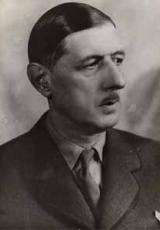De Gaulle and Algeria
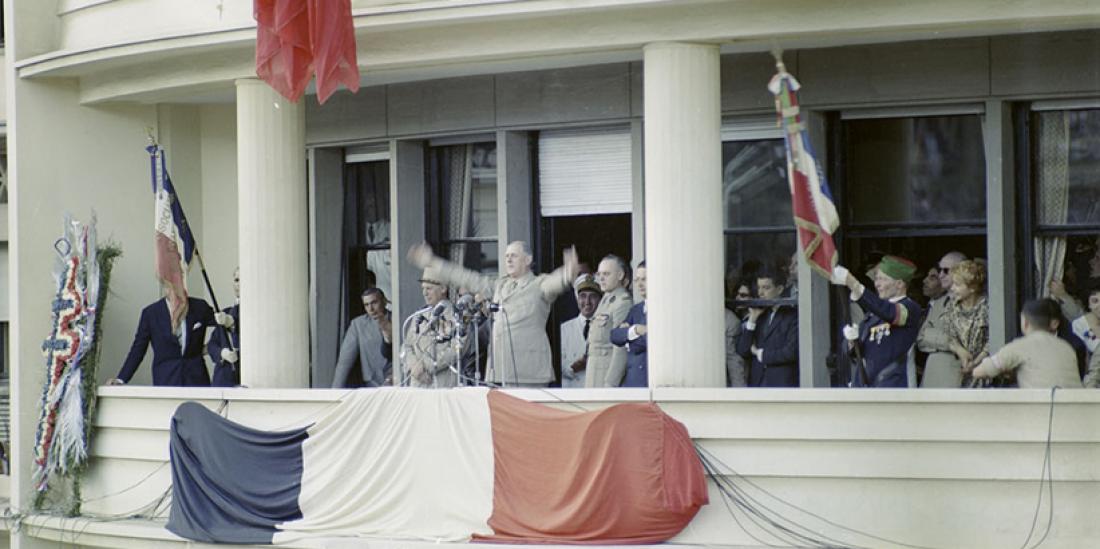
A member of the scientific committee which chaired the symposium “De Gaulle and Algeria”, organised by the DMPA at Les Invalides on 9 and 10 March 2019, historian Maurice Vaïsse sums up the main contributions of participants on the General’s “Algerian mystery”.
Fifty years on from Algerian independence, it was reasonable to hope that such painful episodes as the Sétif and Guelma riots of 8 May 1945 or the drama of the harkis and pieds-noirs might be discussed dispassionately. Such was the successful goal of the symposium, whose speakers were experienced researchers from France and overseas, in particular Algeria, brought together by a scientific committee comprised of Georgette Elgey, Chantal Morelle, Jacques Frémeau, Jean-Pierre Rioux, Benjamin Stora and myself. What emerges from those contributions, in which the historians of the scientific committee played a part? To begin with, an observation: it is clear that, for a man like de Gaulle, whose historical references were marked by the First World War and the fight to defend French soil, the Second World War was a revelation. France was not alone; the Empire was a crucial factor in its rebirth and reconquest. This unprecedented context, in which Algeria became the ideal platform from which to liberate France, explains why de Gaulle would initially show little inclination to question the French presence. Thus, he greeted the 1945 riots in Constantine Province far more as a product of overseas machinations than as revealing a deep-seated problem. In the meantime, de Gaulle felt the reservations of the Algerian French, who were largely in favour of the Vichy regime, but he also noted how passionate these “Africans” (native French and Muslims combined) were about the liberation of France. The “de Gaulle mystery” therefore lies in what his plans were for Algeria. When he returned to power, did he really know what he wanted to do? Was it his conviction that independence was inevitable? In which case, why wait four years to put an end to the war? This symposium shed instructive new light on these questions..
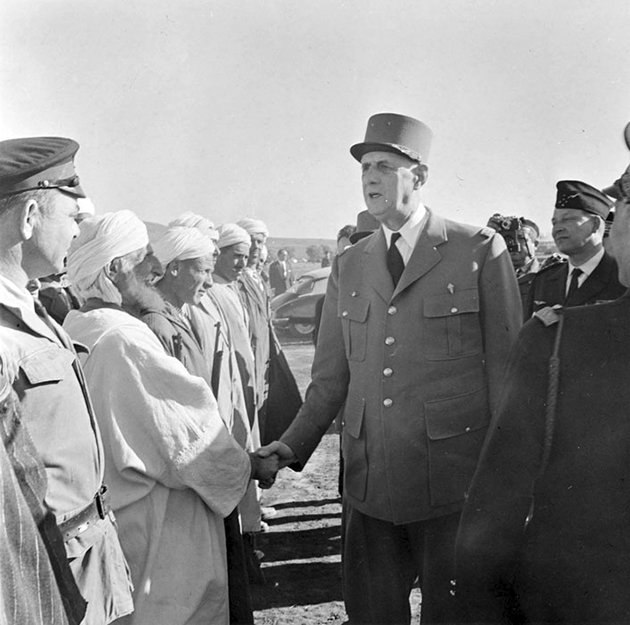
General de Gaulle on a visit to Aziz and the Souaghi outpost, 6 March 1960. © Ecpad
First point: de Gaulle is often described as a solitary figure, who decided everything alone. Yet that view needs to be relativised. It is likely that his political entourage played a considerable role. Not only at the Élysée Palace – with the influence of men like Bernard Tricot, the president’s adviser on Algerian affairs – but also at Matignon, with the General’s enigmatic decision to make Michel Debré prime minister in 1959. If de Gaulle wanted independence for Algeria, why appoint as head of government the former director of newspaper Courrier de la Colère, which, under the Fourth Republic, Debré had turned into a platform for pro-French Algeria campaigning?
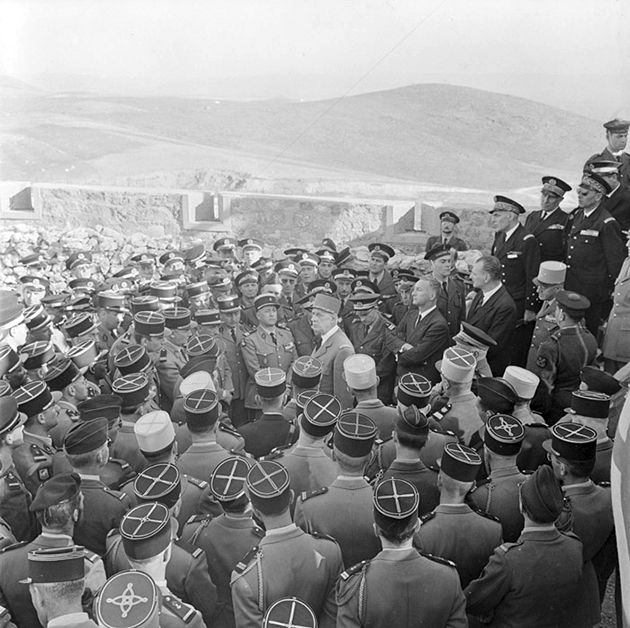
General de Gaulle on a visit to the Algiers area after the “Generals’ Putsch”, April 1961. © Ecpad
Second point: de Gaulle is thought of not only as taking every decision, but as master of everything, invested with absolute power. Yet the opposite was true. If his personal archives are to be believed – part of which has been published in his Lettres, notes et carnets (1) – we know that the injustices committed in Algeria did not end with the General’s return to power. Worse, de Gaulle found himself facing considerable opposition. Particularly in metropolitan France, from pro-French Algeria supporters and from advocates of “Peace in Algeria”, but also from the Algerian French who, singled out as “obstacles to peace”, would condemn him from the time of the OAS. Finally, there was opposition from the army and international pressure. In such a war, the fighting took place not only on the ground, but also in people’s minds and in international forums, particularly the UN. The General’s often ambiguous words were either exaggerated or cut, depending on the case, by certain elements of an army determined not to allow victory to be snatched from it on the ground. For the military, any political steps had to be ruled out before a ceasefire; for de Gaulle, meanwhile, the solution to the Algerian problem could not be exclusively military. Hence his various initiatives, which put him out of step with the heads of the army, who were committed to maintaining the French presence in Algeria. An eventual confrontation was thus inevitable. It is worth pointing out, however, that the majority of the army was not politically committed to French Algeria. It was closer to the opinion held in metropolitan France. Lastly, in terms of the international context, the speakers highlighted the stance of the superpowers, USA and USSR. Concerning the Americans, in particular, who wanted to see Algeria gain its independence, a number of studies have tended to show the importance of US influence on French policy over Algeria. However, while this is undeniable under the Fourth Republic and ultimately brought it down, it is more problematic under de Gaulle
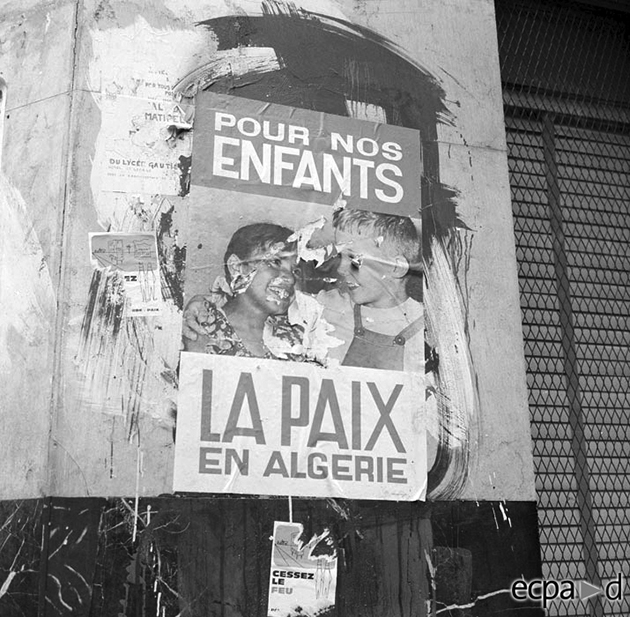
Affiche en faveur de la paix au moment des accords d'Evian, Alger, mars 1962. © Ecpad/Grimaud
Third point highlighted by the symposium: de Gaulle’s ongoing desire to find a political solution, whether through negotiations or the creation of a third political force capable of setting itself apart from the hardliners of both camps in Algeria. From this point of view, General de Gaulle prioritised direct contact with Algerian nationalists, which he was to continually reiterate, either through his envoys or in his own speeches. Let us recall, for instance, the extraordinary case of Si Salah, the Algerian nationalist whom de Gaulle met in 1960 and who, contrary to the hard line taken by the FLN, was in favour of the Paix des Braves (“Peace of the Brave”). Meanwhile, when the real negotiations got under way at Évian, de Gaulle was to follow them closely, harassing the negotiators. He was increasingly impatient to get things over and done with, at the price of concessions which might appear to us exorbitant. So why was it so hard to end the conflict? Because the FLN, then the GPRA (Provisional Government of the Algerian Republic), were hesitant and divided, as revealed by the internal frictions within the ALN (National Liberation Army). In an exciting discussion, Dr Chawki Mostefaï told how, as the GPRA’s representative in Rabat, he had asked the Algerian-based French ethnologist, Germaine Tillion – who, like Camus, rejected terrorism, whatever its source – to explain to de Gaulle that, the more time passed, the stronger the radical branch of the Algerian nationalist movement was likely to become. And that Ferhat Abbas would be succeeded by intransigent leaders – which was in fact what happened. Meanwhile, on the issue of the Sahara, Algerian leaders were wary of their Moroccan and Tunisian “brothers”, who might have been tempted to cooperate with de Gaulle with a view to exploiting the Sahara’s natural wealth..
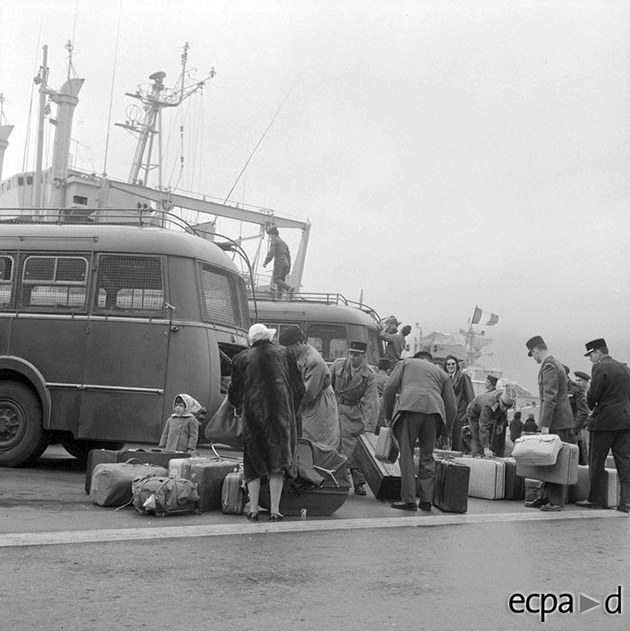
Departures for France, Algeria, April 1962. © Ecpad/Creuse
Fourth point mentioned at the symposium: the effect of time. Reaching a negotiated solution proved so difficult that, as the months went by, de Gaulle became increasingly impatient. General Challe wanted to see through his pacification plan, which had the ALN on its knees. For his part, Michel Debré wanted more time to put in place a “third force”. But the GPRA dodged any real negotiations. Hopes of peace vanished, and de Gaulle, keen to put France back at the forefront of Europe, launched his project for a political Europe, founded on a Franco-German alliance. Against this backdrop, how important were the pieds-noirs and harkis? The State’s powerlessness against acts of terrorist violence, the inadequate system in place for receiving refugees in metropolitan France, or what might have been perceived as negligence in view of such a historical trauma, prompted lasting resentment, which also explains the difficulty in reconciling the recollections of General de Gaulle’s policy towards Algeria.


